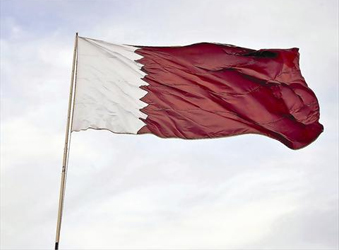Qatar’s foreign minister said the tiny emirate has U.S. backing to resolve the ongoing crisis with a Saudi-led alliance, but the country is also prepared should its Gulf Arab neighbors make military moves.
The Trump administration is encouraging all sides to end the dispute and has offered to host talks at the Camp David presidential retreat, but only Qatar has agreed to the dialogue, Foreign Minister Sheikh Mohammed Al-Thani said Friday. Four countries in the Saudi-led bloc severed diplomatic and transport links with Qatar in June, accusing it of backing extremist groups, a charge Doha has repeatedly denied. Saudi Arabia closed Qatar’s only land border.
Sheikh Mohammed said he will meet Secretary of State Rex Tillerson next week after having talks this week with Senate Foreign Relations Committee chairman Bob Corker and ranking member Ben Cardin as well as other congressional leaders.
“The Middle East needs to be addressed as the top priority of the foreign policy agenda of the United States,” he told reporters in Washington on Friday. “We see a pattern of irresponsibility and a reckless leadership in the region, which is just trying to bully countries into submission.”
The Middle East has been a key foreign policy issue for the Trump administration, with much of it centered around support for the Saudis. The White House has backed the kingdom’s “anti-corruption” campaign that has ensnared top princes and billionaires once seen as U.S. allies, it has provided support for the Saudis in their war in Yemen and it has been muted in criticism of the crisis sparked when Lebanon’s prime minister unexpectedly resigned this month while in Saudi Arabia.
Meanwhile, mediation attempts by Kuwait and the U.S. have failed to settle the spat with the Saudi-led bloc and Qatar. Sheikh Mohammed accused Saudi Arabia of interfering in other countries’ affairs, citing the resignation of Lebanese Prime Minister Saad Hariri as an example of the oil-rich kingdom’s overreach and warning that other countries could be next.
Asked about the prospect of the Saudi-led bloc taking military action, Sheikh Mohammed said though Qatar hopes that won’t happen, his country is “well-prepared” and can count on its defense partners, including France, Turkey, the U.K. and the U.S., which has a base in Qatar.
“We have enough friends in order to stop them from taking these steps,” but “there is a pattern of unpredictability in their behavior so we have to keep all the options on the table for us,” he said. On the U.S. military presence, “if there is any aggression when it comes to Qatar, those forces will be affected,” he added.
Already, the boycott is impacting the U.S.-led coalition fighting Islamic State militants in Iraq and Syria, Sheikh Mohammed said. Qatar’s C-17 transport aircraft are the main planes ferrying logistical support to coalition partners, such as Jordan and Turkey. But because Qatari planes are barred from flying over Saudi, Bahrain and the United Arab Emirates, “we have only one pathway to fly, which is via Iran,” so that if there’s an emergency the planes may have to land in the Islamic Republic, he added.
The U.S. has flown Air Force personnel on Qatari C-17 missions when Defense Department regulations have required a U.S. service member to accompany certain cargo, but “we are not aware of any cargo flights over Iran,” Marine Corps Major Adrian Rankine-Galloway, a Pentagon spokesman, said. The U.S. has no plans to change its posture in Qatar, he added.
“We encourage all our partners in the region to reduce tensions and work towards common solutions that enable regional security,” Rankine-Galloway said in an email. The Pentagon supports Tillerson’s efforts to resolve the dispute, as “we believe our common fight against terrorism and our commitment to the security of the region is more effective when” the Gulf Cooperation Council countries are united, he said.
source: Bloomberg


